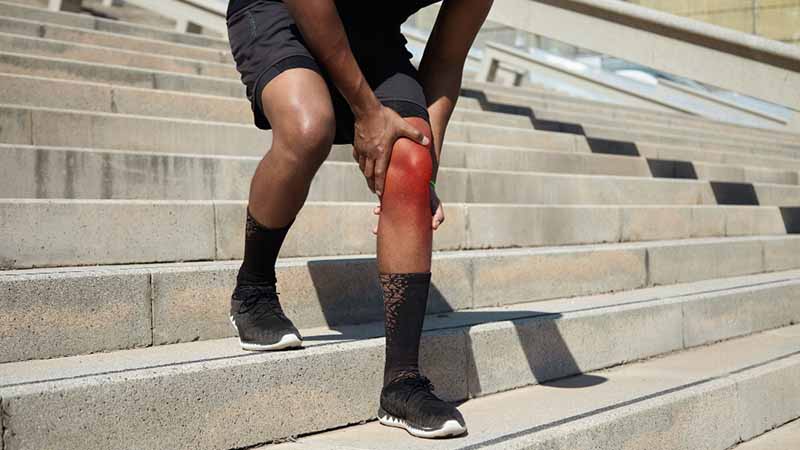Have you ever woken up in the middle of the night due to a sudden, acute ache in your calf muscle? If so, you may have had a leg cramp. Leg cramps are a very common ailment that can afflict people of all ages. While they are rarely dangerous, they can be excruciatingly unpleasant.
What is a leg cramp and reasons why it happens?
Leg cramps are painful, involuntary muscle spasms that occur suddenly. They often affect the calf muscles, but they can also affect the thighs, feet, and even arms. Leg cramps are more prevalent in elderly people, but they can happen at any age.
Even though there are many ways to prevent and treat leg cramps, it is often hard to figure out why they happen. Yet, the following frequent risk factors might enhance your chances of having leg cramps:
- Dehydration
- Long durations of sitting or standing
- Pregnancy
- Muscle overuse during exercise
- Deficiencies in nutrition
- Inadequate blood circulation
- Medications Diuretics, statins, and beta-blockers
[Also check: Is Your Muscle Cramped?]
Dehydration
Leg cramps can also be an indication of dehydration, so make sure you drink enough water. This can help you avoid cramps and lessen their severity and length if you do have them.
Long durations of sitting or standing
Leg cramps might occur if you have a sedentary lifestyle or work that requires you to stand for lengthy periods. Try to move about every few hours and stretch your legs frequently. You may also want to consider purchasing the most recent cross-legged office chair to guarantee proper blood circulation while working. It's not the most fashionable option, but your legs will thank you!
Pregnancy
Pregnant women are more prone to leg cramps due to the extra weight and stress on their bodies. This can sometimes result in dehydration, so drink lots of water and avoid standing for lengthy periods. stretching softly
Muscle overuse during exercise
Cramping might occur if you push your body too hard during activity. Warming up before exercise and cooling down afterward is critical. To avoid overuse injuries, gradually increase the intensity and length of your workouts,
Deficiencies in nutrition
Leg cramps can also be caused by nutritional deficits. A shortage of calcium, magnesium, or potassium, for example, might cause muscular cramping. To avoid deficiencies, eat a well-balanced diet and take a multivitamin if necessary.
Inadequate blood circulation
Cramps might occur if you have inadequate blood circulation because your muscles aren't getting enough oxygen. This is frequently an issue in older folks, but it can also be caused by obesity, smoking, or sitting in the same posture for an extended time. To increase circulation, try to move around often, getting up and walking about every few hours.
Medications Diuretics, statins, and beta-blockers
See your doctor if you're taking any medications to determine whether they might be causing your cramps. Most of the time, there are ways to deal with the bad effects of leg cramps or other muscle cramps.
As you can see, there are several reasons for leg cramps. While some individuals are more prone to them, practically everyone can get a leg cramp at some point in their lives. The good news is that there are several leg cramp remedies and preventive strategies accessible.
How can I avoid leg cramps?
There are a few things you can do to avoid leg cramps, including:
- Stay hydrated throughout the day.
- If you have a sedentary job or lifestyle, take regular breaks.
- Before and after exercise, you should warm up and cool down.
- Make your workouts longer and more intense.
- Consuming a well-balanced diet and, if necessary, taking a multivitamin.
- To enhance circulation, get up and move about every few hours.
- Discuss with your doctor any drugs you are taking that may be causing cramps.
Remedies for leg cramps
There are several leg cramp remedies available, including:
- Doing a stretch on the concerned muscle
- The muscle is being massaged.
- Administering heat or cold to the affected muscle
- Bathe or shower in warm water.
- Taking ibuprofen or acetaminophen as an over-the-counter pain reliever
- Consuming lots of fluids, particularly water.
- Consuming electrolyte-rich meals such as bananas, sweet potatoes, and dark leafy greens.
- Changing your sleeping posture
- By wearing shoes and socks that are supportive.
- Taking a magnesium or calcium supplement regularly
[You may also like: Know how to deal with muscle cramps!]
Who is predisposed to leg and muscle cramps?
Certain persons are more prone to leg and muscular cramps than others, such as:
- Senior citizens.
- Women who are pregnant.
- Overweight or obese individuals
- Smokers
- Individuals who have weak blood circulation
- Individuals who sit for long periods without moving
- Athletes or those who regularly exercise
- Individuals suffering from specific medical disorders, such as diabetes, renal illness, or thyroid issues
- Individuals who use diuretics, statins, or beta-blocker
When should you visit a doctor?
Most leg cramps can be managed at home and will resolve on their own. But you should contact a doctor if you get leg cramps that are:
- Severe or frequent.
- Lasts for more than a few minutes.
- Additional symptoms such as numbness, tingling, or weakness may occur.
- Interfering with your normal routine.
Conclusion
You may help keep cramps at bay by staying hydrated, stretching, and modifying your lifestyle as required. There are several therapies available to help ease the pain and suffering caused by leg cramps. But if you have cramps regularly or if they are accompanied by other symptoms, you should contact a doctor to rule out any underlying medical concerns.
